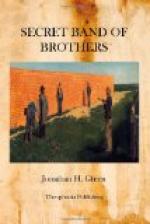On the day of my discharge I was visited by a man, to me unknown. He informed me that he had procured my acquittal, and was my sincere friend and well-wisher; that he desired always to remain the same—and would, during life, on condition that I acted in accordance with his wishes.
I considered him a strange person, to introduce himself in so singular a manner. He advised me to leave the city as soon as possible. I told him that was my intention. I likewise informed Mr. Munger of the same, and he readily consented, as Taylor’s trial had been put off. Arrangements being made with him, I expected to leave the next day. In the mean time, I had an interview with Cunningham, who told me I must look out, for the brotherhood in general suspected me of foul play as to the papers. I denied all knowledge of them—for I found it my only safety to pursue one uniform course.
He continued: “The party are determined to have them at all hazards, and are now more convinced than ever that you are in the secret. All the circumstances are against you—more especially since the custom-house was broken open, which robbery was perpetrated for the express purpose of finding the papers. It was thought if the colonel had disposed of them, they would be found there; but now they will hold you responsible. I bid you farewell.”
On the same evening I had this conversation with Cunningham, I went with Smith to the gambling-house: the same day, too, on which I won seventy dollars in the flat boat—the first and dearest money I ever won at gaming, as it nearly cost me my life—the full account of which is given in the work previously mentioned.
On the second day after this, as I was about leaving for Mobile, I met the gentleman who had procured my release. He advised me to depart forthwith, promising to meet me at another time. As we were separating he placed in my hands a box.
“Here,” said he, “is a box, containing something I wish you to keep with great care. You must not open it till I give you permission.”
I took the same. It was a small box, made of oak, three inches high, eight long, and five wide. Its possession gave me much uneasiness for twelve years—during which time I remained faithful to my instructions. I frequently met with my benefactor. The last time I saw him was in Philadelphia, in 1841. I have received from him nine letters, in all, of a good moral character, and always referring to the box. This individual’s name I have never been able to learn. No two letters ever bore the same signature, but the identity of their contents convinced me they were all from the same person. That mysterious box I have preserved to the present day.




